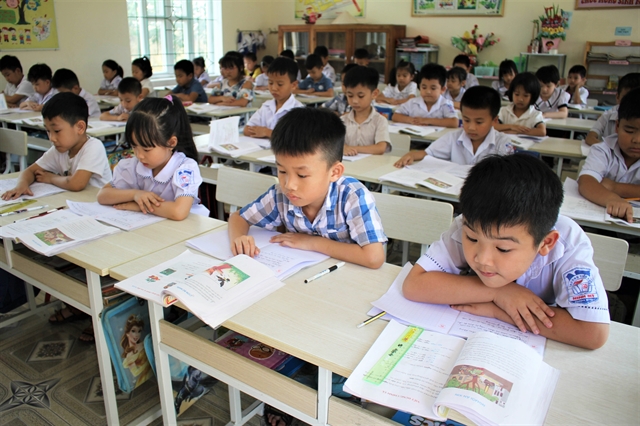 Society
Society

The Ministry of Education and Training on Sunday asked a national textbook assessment council to review the first-grade Vietnamese language textbook over concerns its content is inappropriate for first-graders.

|
| First-grade students of Ninh Mỹ primary school in the northern province of Ninh Bình during a Vietnamese class. The province opted to use the Cánh diều (Kite) textbook set, which has recently been criticised for inappropriate content. — VNA/VNS Photo Hải Yến |
HÀ NỘI — The Ministry of Education and Training recently asked a national textbook assessment council to review the first-grade Vietnamese language textbook over concerns its content is inappropriate for first-graders.
Education minister Phùng Xuân Nhạ asked the council to review, clarify and recommend options to correct if needed such “inappropriate knowledge” within this week.
The textbook is part of the new general education curriculum which Việt Nam first adopted this academic year.
For the first time, schools across the country have more than one option of official textbooks for their teachers and students to use. Both public and private stakeholders can develop and introduce their own textbooks which are then assessed by a national council to see if they can be used in schools or not.
Five sets of textbooks for the first grade have received approval for circulation.
The textbook that has recently drawn controversy is the Cánh diều (Kite) textbook set which was developed and introduced by Teacher Training University’s Publishing House, HCM City Teacher Training University’s Publishing House and Việt Nam Educational Equipment and Publishing Investment Company.
About 30 per cent of schools across the country have chosen to use the textbook set. Two-thirds of the textbook compilers helped develop the new national general education curriculum and the first-grade Vietnamese language textbooks of Cánh diều are designed quite similar to the previous one.
However, after the books have been used for more than a month since the new school year started, teachers and parents have raised concerns over their educational value.
For example, parables are used in the textbook to help students practise syllables and consonants. With the limited syllables, consonants and words first-graders have learnt, some stories are cut short or modified, resulting in misunderstandings or vague sentences.
Some people were angered to find a reading exercise in the textbook featuring a short story about a hard-working horse and a lazy one. In the story, the hard-working horse said if he did not work, his master would scold him while the lazy horse said that if the master asked him to work, he would run away.
The story, a modifed version of a fable by the Russian writer Leo Tolstoy, ends with the hard-working horse's muttering in agreement: "What a sound idea."
Many took issue with the story's ending, opining that it might encourage their children to be lazy, irresponsible and "run away" from hard work.
The book compilers have also been criticised for using dialects or vague words that are strange to many first graders, so teachers found it difficult to explain them.
Professor Nguyễn Minh Thuyết, chief editor of the new national general education curriculum and lead editor of Cánh diều, said previous primary textbooks launched in 2002 also got controversial reactions initially. However, in the last 18 years, many teachers said the books were easy to teach and suitable for students.
“I hope that people can read the textbooks carefully and get to know about teaching first-graders before judging them,” he said, adding that the book compilers would listen and make necessary corrections after getting feedback from teachers and students.
“I believe students’ parents could see the books work. It’s necessary to correct incorrect parts but the corrections also need consideration and a clear roadmap,” Thuyết said.
Deputy Prime Minister Vũ Đức Đam on Monday said different opinions over the new textbook showed the public is highly concerned about children's education and people all share the desire to have textbooks that meet teaching and studying requirements.
Đam asked the education ministry to listen to contributions and adjust to improve the quality of textbooks.
He also asked for adjustments and additions to regulations relating to the compilation, assessment and approval of textbooks as well as instructing teachers to use them effectively.
“Besides the national textbook assessment council, candidate textbooks should be made available online so teachers, experts and students’ families could easily view them and at least unexpected mistakes could be found early,” Đam said.
The Ministry of Education and Training was also asked to speed up the provision of e-learning materials for the new textbooks so that teachers could select suitable materials for their teaching. — VNS